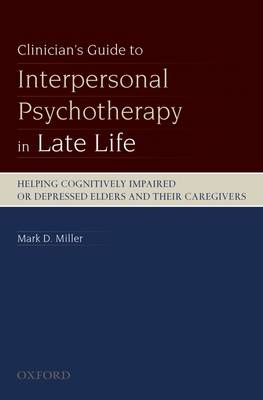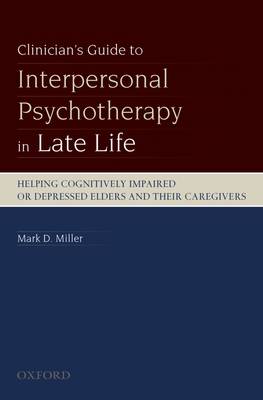
Door een staking bij bpost kan je online bestelling op dit moment iets langer onderweg zijn dan voorzien. Dringend iets nodig? Onze winkels ontvangen jou met open armen!
- Afhalen na 1 uur in een winkel met voorraad
- Gratis thuislevering in België vanaf € 30
- Ruim aanbod met 7 miljoen producten
Door een staking bij bpost kan je online bestelling op dit moment iets langer onderweg zijn dan voorzien. Dringend iets nodig? Onze winkels ontvangen jou met open armen!
- Afhalen na 1 uur in een winkel met voorraad
- Gratis thuislevering in België vanaf € 30
- Ruim aanbod met 7 miljoen producten
Zoeken
Clinician's Guide to Interpersonal Psychotherapy in Late Life
Helping Cognitively Impaired or Depressed Elders and Their Caregivers
Mark D Miller
Paperback | Engels
€ 81,95
+ 163 punten
Omschrijving
Interpersonal Psychotherapy for Cognitive Impairment (IPT-ci) aims to improve coping skills of older adults. It builds on traditional Interpersonal Psychotherapy, an evidence-based treatment that has been found useful in treating depressed elders. Cognitive impairment, a common occurrence in the older population due to disease or age-related causes of changes in brain function, calls for additional strategies to optimize functioning. IPT-ci seeks to help older patients and their caregivers manage the effects of cognitive impairment, particularly in the early phase when behavior changes are often misunderstood, as well as to plan for potential future declines in cognitive functioning. Part I offers an overview of IPT principles and the development of IPT-ci, as well as essential background information for those new to the field of clinical geriatrics. Chapters on late-life depression, cognitive impairment/dementia, and executive function provide key points of reference for working with this population. Part II demonstrates the IPT-ci approach from the initial interview through long-term follow up. Special attention is paid to the role of concerned family members or caregivers and the role transition they are going through becoming caregivers. This guide is replete with case examples, numbered for easy reference and representing a range of patients and issues. Detailed analysis clarifies the application of IPT-ci elements. Clinicians will find this guide a practical resource for treating older patients and assisting their caregivers from the first visit to lifelong management.
Specificaties
Betrokkenen
- Auteur(s):
- Uitgeverij:
Inhoud
- Aantal bladzijden:
- 208
- Taal:
- Engels
Eigenschappen
- Productcode (EAN):
- 9780195382242
- Verschijningsdatum:
- 21/04/2009
- Uitvoering:
- Paperback
- Formaat:
- Trade paperback (VS)
- Afmetingen:
- 231 mm x 152 mm
- Gewicht:
- 300 g

Alleen bij Standaard Boekhandel
+ 163 punten op je klantenkaart van Standaard Boekhandel
Beoordelingen
We publiceren alleen reviews die voldoen aan de voorwaarden voor reviews. Bekijk onze voorwaarden voor reviews.











